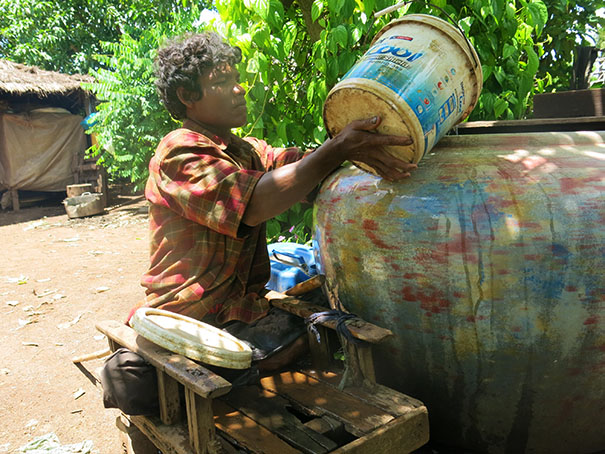Recently, I joined 33 of my CWS colleagues in Phnom Penh for a three-day educational workshop on disability. Our staff came from several provinces to learn how CWS can help reduce barriers in our program activities for people with disabilities.
First, we reviewed the definition of disability, the physical and social barriers to community inclusion and the legal framework created to protect people with disabilities, including the United Nations Convention on the Rights of Persons with Disabilities. The Cambodian Law on the Protection and the Promotion of the Rights of Persons with Disabilities, Article 18, states that “the concerned competent ministries and institutions shall facilitate persons with disabilities to participate in the social, economic and cultural development plans that may affect the interests of persons with disabilities. The concerned ministries and institutions shall include the needs of persons with disabilities into their development programs”.
The workshop included lectures, group discussions and plenty of activities to reinforce our learning. During our time together, as I looked around at my colleagues, I was struck by how eager we were to learn. I was happy that there was plenty of discussion about how our new-found knowledge could be used with communities and families where we work throughout rural Cambodia.
In working at CWS, we have a mandate to help marginalized and vulnerable people improve their lives, and people with disabilities are often the most marginalized and vulnerable in Cambodia. CWS is committed to being inclusive in all humanitarian and development activities. When we have a chance to work with people with disabilities, we are especially committed to supporting them to build confidence and self-reliance.
In our Promoting Better Lives project we join communities to focus on activities that foster socioeconomic development by addressing food insecurity and livelihood improvement with informal education opportunities and with support to help families meet basic needs. Such a project gives us opportunities, as always, to be inclusive of people with disabilities and special needs.
Sitting in the workshop, I reflected on my work with Ket Yorn, a 36-year-old man with a disability who lives with his wife and a daughter in Ta Pov village in central Cambodia. Yorn was shot in both legs by a Khmer Rouge soldier in 1993 and, since then, he has been unable to walk. But Yorn hasn’t let his disability keep him from working hard to provide for his family by partnering with his wife, Mao Yim.
CWS started working with Yorn last year when our team talked with him and Yim about the possibilities for Yorn to join Promoting Better Lives project activities, like mushroom growing. To help the family address the particular challenge of Yorn’s limited mobility, CWS agreed, with 15 neighboring families’ agreements and community contributions of cash and in-kind labor to support digging and equipping one hand-pump well in front of Yorn’s house which has benefitted everyone – and, especially, Yorn, so now he can easily collect water for watering plants and mushroom growing. “CWS and my wife’s hard work encouraged and inspired me to believe that I can do more than just helping my wife at the rice field,” said Yorn.
Of the 1,138 people in his village, 11 (one percent) have a disability. Now, Yorn has become an advocate for other disabled persons by sharing his story and also attending village planning meetings for community development. “I am now confident that I can actively participate in development work and social work to help change my community,” said Yorn. “I am now not feeling excluded, I can participate in any activities as others. I am grateful to CWS, and Yim, for their commitment and hard work in supporting me to build my confidence.”
Tauch Norneath is CWS’s Project Manager in Kampong Thom, Cambodia.

